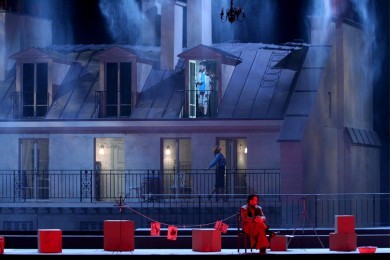This opera, which has a legendary reputation as well as existing in a large number of versions of the score, is returning to the Mariinsky Theatre eleven years since the last production. The new production is being put together by a team that has received theatre prizes in St Petersburg and throughout Russia on numerous occasions for its previous works at the Mariinsky Theatre.
Vasily Barkhatov believes that “Les contes is the drama of a man who conjures up a dream, gives it a woman’s name and becomes lost in painful reveries. Hoffmann becomes transformed from an impressionable artist into the most ordinary of men – not free, it is true, to cross the border between his own imagination and reality. The protagonist, experiencing the drama of love and grasping the fact that he is no Jimmy Hendrix, so to speak, becomes a mid-ranking manager and begins to lose his hair.”
The role of Hoffmann is being rehearsed by young tenor Sergei Semishkur, whose repertoire includes such French music as Hector Berlioz’ Les Troyens and Benvenuto Cellini, has already worked with Barkhatov on productions of Leoš Janacek’s Jenufa, Rodion Shchedrin’s Dead Souls and the aforementioned Benvenuto Cellini.
The female roles are being rehearsed by Marina Aleshonkova, Kira Loginova, Olga Pudova and Larisa Yudina as Olympia, Zhanna Dombrovskaya, Lyudmila Dudinova, Gelena Gaskarova, Anastasia Kalagina, Olga Trifonova and Oxana Shilova as Antonia and Zhanna Afanasieva, Irina Mataeva, Tatiana Pavlovskaya, Yekaterina Solovyova and Viktoria Yastrebova as Giulietta.
The lead bass role is being rehearsed by Ildar Abdrazakov and the renowned Sergei Aleksashkin, who sang in the premiere of Marta Domingo’s production of Les contes in 2000. In the new production at the Mariinsky Theatre, as envisioned by the composer himself, the wicked Dr Miracle, Dapertutto, Coppelius and the experience-rich Lindorf – in Barkhatov’s version alter egos of the protagonist – will all be performed by one singer.
Important facts:
• The new production is using the fullest version to date of the score of the opera Les contes d’Hoffmann produced for publication by Michel Carré and Jean-Christophe Keck (Offenbach died before he could complete the orchestration, which is why several versions of the opera exist). This version sees the revival of the original order of the acts (Olympia –Antonia –Giulietta) and dialogues take the place of recitatives and music more than audiences are generally accustomed to.
• The libretto of Les contes d’Hoffmann was written using motifs from three of Hoffmann’s tales – Olympia was taken from the novella Der Sandmann, the sickly Antonia from the play Rath Krespel (part of the series Die Serapionsbrüder) and the story of Giulietta the courtesan and the evil sorcerer Dapertutto from the tale Das Verlorene Spiegelbild.
In Vasily Barkhatov and Zinovy Margolin’s stage version, the plot of the opera is interwoven with plotlines from François Truffaut’s La Femme d’à côté, Stanley Kubrick’s The Shining and Ron Howard’s A Beautiful Mind.
• Les contes d’Hoffmann was first staged at the Mariinsky Theatre in 1899 in Russian and was directed by Osip Palechek with the dances being staged by Lev Ivanov, co-choreographer of Swan Lake. Marta Domingo staged the last production of Les contes d’Hoffmann at the theatre in 2000 using Michael Kaye’s version of the opera.
• Also working on the premiere are Mikhail Tatarnikov (conductor), Alexander Sivaev (lighting designer), Marina Mishuk (musical preparation), Andrei Petrenko (principal chorus master), Larisa Gabitova, Oxana Klevtsova, Tatiana Sinelnikova, Irina Trutko, Dmitry Yefimov and Marina Yevseyeva (accompanists), Pavel Petrenko and Leonid Teplyakov (chorus masters), Kristina Larina (assistant stage director) and Xenia Klimenko and Maria Levina (French language coaches).
• Among those rehearsing the premiere are Viktor Aleshkov and Sergei Semishkur as Hoffmann, a poet, Marina Aleshonkova, Kira Loginova, Olga Pudova and Larisa Yudina as Olympia, a doll, Zhanna Dombrovskaya, Lyudmila Dudinova, Gelena Gaskarova, Anastasia Kalagina, Olga Trifonova and Oxana Shilova as Antonia, Crespel’s daughter, Zhanna Afanasieva, Irina Mataeva, Tatiana Pavlovskaya, Yekaterina Solovyova and Viktoria Yastrebova as Giulietta, a courtesan, Maria Maksakova, Yulia Matochkina and Yekaterina Sergeyeva as Nicklausse, Hoffmann’s friend, Elena Vitman and Larisa Gogolevskaya as the Voice of Antonia’s Mother and Ildar Abdrazakov, Sergei Aleksashkin, Ilya Bannik and Andrei Serov as Lindorf, a city councillor, Coppélius, an optician, Dr Miracle and Dapertutto, a sorcerer.
 Mariinsky Theatre:
Mariinsky Theatre:  Mariinsky-2 (New Theatre):
Mariinsky-2 (New Theatre):  Mariinsky Concert Hall:
Mariinsky Concert Hall: 

